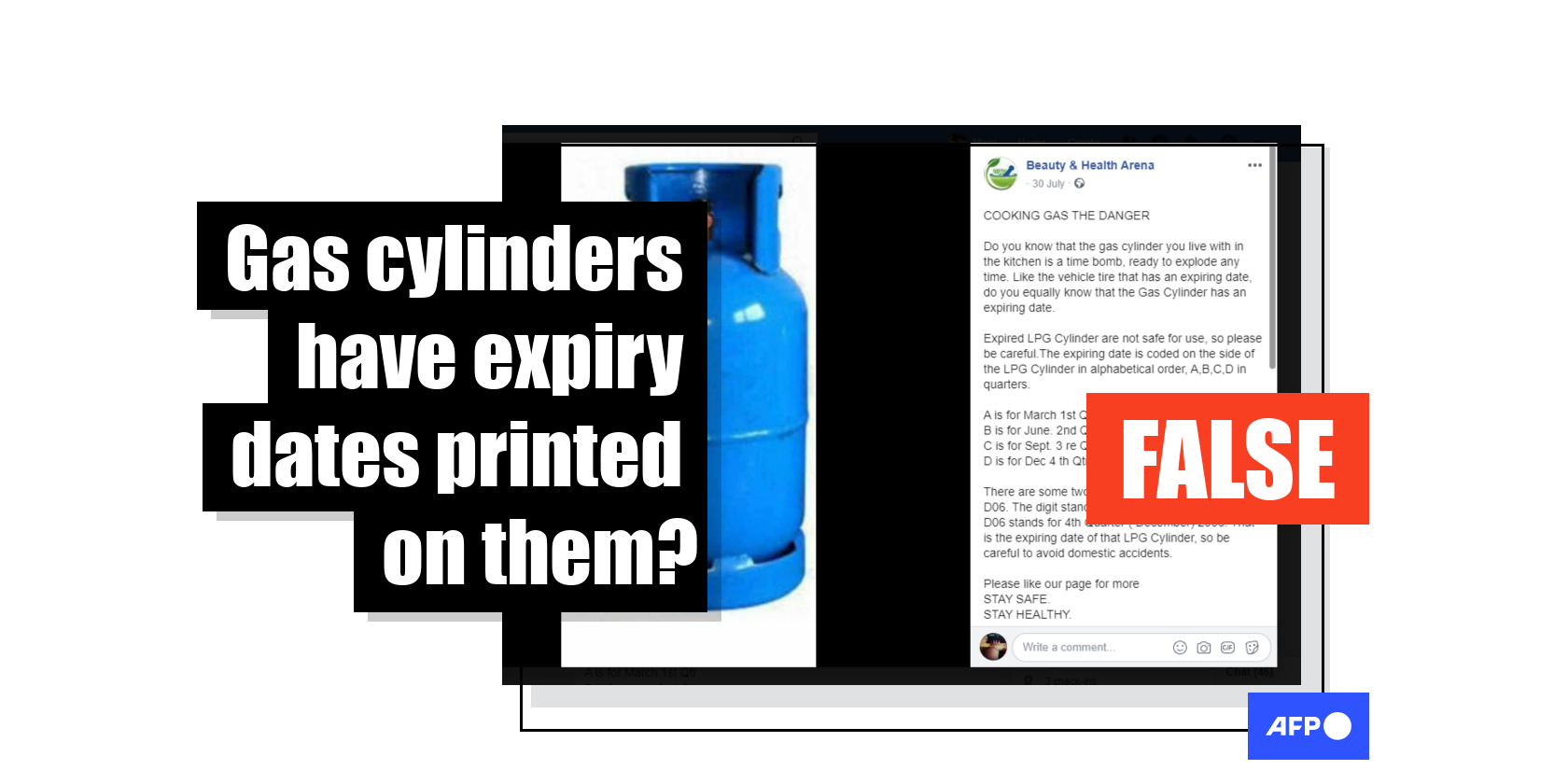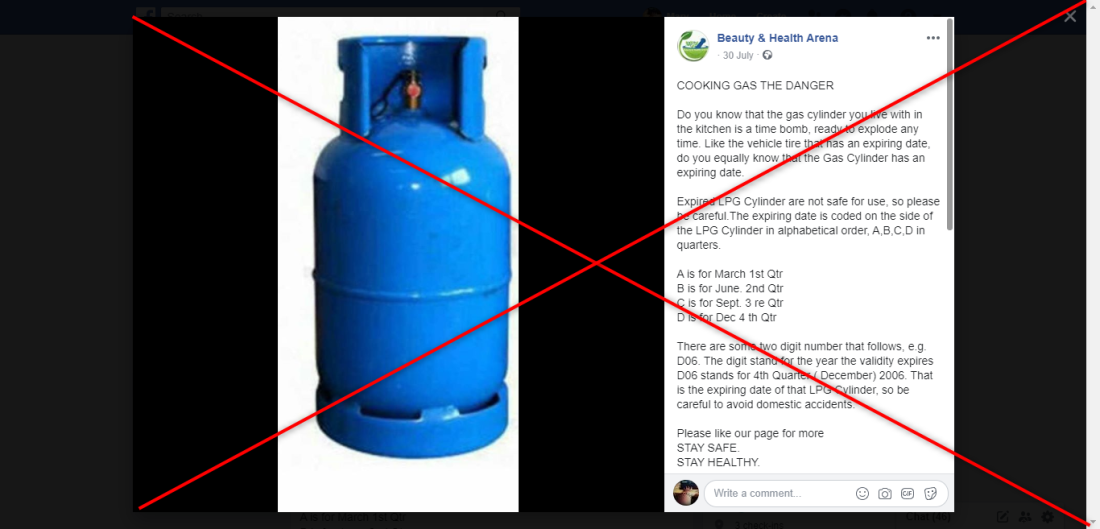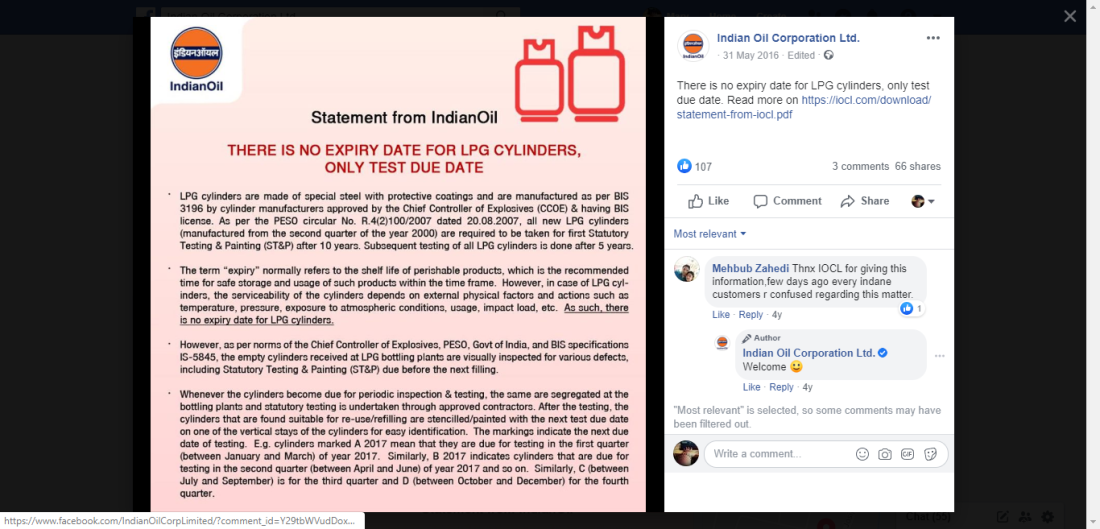
Gas cylinders don’t have expiry dates printed on them
- This article is more than five years old.
- Published on August 12, 2020 at 16:47
- 3 min read
- By Mary KULUNDU, AFP Kenya
“Do you know that the gas cylinder you live with in the kitchen is a time bomb, ready to explode any time,” reads a Facebook post from Nigeria, shared more than 180 times. The post was also shared in Kenya.

It claims that every gas cylinder has an expiry date and those that have “expired” are unsafe to keep in the house. “The expiring date is coded on the side of the LPG Cylinder in alphabetical order, A,B,C,D in quarters (sic),” the post explains further.
Each quarter is said to represent a three-month period (March, June, September and December) followed by a number to indicate the year of expiry.
However, this numbering system is actually used to indicate a future date for routine inspection.
Similar Facebook posts were shared here, here, here and here.
The same claim was published on Youtube (in 2015) and on Twitter (in 2017).
No expiry date
The claim was dismissed in 2016 by the Indian Oil Corporation which noted that “there is no expiry date for LPG cylinders”.
“The term expiry normally refers to the shelf life of perishable products which is the recommended time for safe storage and usage of such products within the time frame… As such there is no expiry date for LPG cylinders,” read the statement.

A search online also revealed a news report published in 2017 by an Indian publication describing the claim as one that recurs annually in the Asian country.
Michael Wasike, an engineer at Chemigas, a gas plant in Nairobi, told AFP Fact Check that unlike perishable products which have a shelf life, gas cylinders undergo inspections to make sure that they adhere to the set safety standards.
“In Kenya, the cylinders are supposed to be used in the market for eight years, then they are supposed to be inspected afresh,” Wasike said in a phone interview.
David Tyler, the director of France-based World Liquefied Petroleum Gas Association (WLPGA), explained in an email to AFP Fact Check that during their periodic inspections, gas cylinders undergo “visual checks for dents, corrosion etc., a date check to ensure the cylinder is not due for requalification, and a tare weight check to ensure the correct amount of LPG is filled into the cylinder”.
What do the codes mean?
The Indian Oil Corporation explained in its press statement that the codes imprinted with letters and numbers indicate the next due date for each cylinder to undergo testing or inspection. It does not mean the cylinder automatically expires, nor does it make the gas bottle a “time bomb”.
“Cylinders marked A 2017 means that they are due for testing in the first quarter (between January and March) of the year 2017. Similarly, B 2017 means that they are due for testing in the second quarter (between April and June) of the year 2017. Similarly C (between July and September) is for the third quarter and D (between October and December) for the fourth quarter,” reads the press release.
Safety precautions
Nonetheless, Tyler cautioned that consumers need to be careful when handling LPG cylinders at home and to ensure the regulator has been fitted correctly to the valve and that it, as well as the hose and appliance, are in good condition.
“Consumers should also make sure there are no leaks by checking all joints with soapy water and – most importantly – ensure there is adequate ventilation for complete combustion,” said Tyler.
AFP Fact Check previously debunked a claim that gas cylinders explode if shaken.
Copyright © AFP 2017-2026. Any commercial use of this content requires a subscription. Click here to find out more.
Is there content that you would like AFP to fact-check? Get in touch.
Contact us
